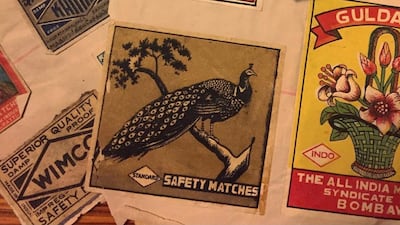Last year, Dr Shubhangi Tambwekar from Bengaluru was looking for a way to preserve her daughter's matchbox collection. Her daughter, Arundhati, had died in a road accident in 2014, and Tambwekar wanted the collection to go to someone who would cherish it. When she researched online, she discovered Artonabox.
Shreya Katuri's Instagram account features images of 5,000 matchboxes. It spreads awareness, connects people, and offers a place for anecdotes and personal stories.
Matchbox labels intrigued Katuri, and it's no wonder, as they have an illustrious history and are intricately designed.
History of the matchbox
The process of generating fire was arduous until the invention of a friction match. After many years and experiments, the first phosphorus-based safety match was developed in Sweden in the late 19th century.
India imported matchboxes from Sweden and Japan before the First World War. In 1910, Japanese immigrants started making matches in what was then Calcutta. The locals learnt the skills, and a few match factories sprung up in the city.
The first sulphur match that ignited when struck on a rough surface was made in South India in 1923, and the first safety match as known today was made in 1932. Wimco started its operations as a unit of the multinational Swedish Match Company in 1924.
“Today, Wimco is the only recognised and established matchbox brand in India with a national presence. All others are small one-room set-ups in Sivakasi, South India," says Shahid Datawala, co-author of Matchbook, which looks at the whimsical nature of label art.

From function to design
As matchboxes became vital, the technique of designing labels developed over a period of 123 years (1827-1950). Its packaging became the prime factor for differentiation and competition.
Early labels contained the factory name and location or instructions on how to use them. The first pictorial label was produced in 1830 by N Jones & Co in England. The World Wars affected matchbox production and marketing, significantly impacting label patterns.
Widespread and frequent use of matchboxes made the labels conspicuous, adding visual appeal, distinct branding and encouraging sales.
In India, early labels with unfamiliar objects were replaced by images from Indian mythology, art, religion and architecture, explains Gautam Hemmady, a retired architect in Delhi who started collecting matchboxes in 2012.
The top space of the Indian matchbox was adorned by designs that included borders, gods and goddesses, brides, flowers fruit, animals and modes of transport.
The nationalist movement brought Gandhi and Bharat Mata (Mother India). Symbols of the flag, spinning wheel and pictures of nationalist leaders were illustrated until independence and replaced by maps, and the Ashok Chakra after independence.
Indian brand The Ship (1942), which still enjoys a strong market presence, has inspired imitations and several variations of its label - ‘Shib’, ‘Slip’, ‘Swip’, ‘Shipe’, ‘Shaan’, ‘Sharp’ and more.
“Most small brands have their own graphics”, says Datawala. In the tiny space, many things were fitted with smart-thinking and minute alterations.
Illustrations evolved with time, says Katuri. The liberalisation of the 1990s brought images of logos and brands. Ship or a Maruti car images were replaced by the Tata Nano, an Esteem car, or Delhi Metro indicating the change.
Logos, artwork and colour were envisaged and assembled like a product. "Matchbox design was not just making a matchbox, but a product you put into your pocket to use,” explains Datawala. Alterations of strike patterns, pictures and typography by artists created an identity for their own designs.
The collectors of the matchbox today
Phillumenists, or collectors of matchboxes, have been gathering labels for more than a century for personal reasons. For Hemmady, who has a huge collection and owns a matchbox label from 1893, it is all about history.
Imitations of the "New Ship" label intrigued Datawala. “I started noticing labels in shops, and on roads. These were copies of copies of copies.” He collected about 85 smart and intelligent variations of copies of Ship labels.
Warren Dotz, a pop culture historian from the US and author of Light of India: A Conflagration of Indian Matchbox Art, has an interest in "everyday label art that has gone unappreciated". It began when he found an Indian matchbox label titled "elephant love", while purchasing an advertising store display from a collectibles dealer in England, leading him to collect Indian labels from dealers all over the world and eventually write the book, featuring labels from the 1950s and 1960s.

Now, the humble match has remained the same in concept and construction. What evolved was a new form of art: label art with curious graphic and typographic elements.
"Someday, we hope to start a museum with matchbox designs combining Light of India and Art on a Box," says Dotz.
We'll have to wait and see if that idea catches fire.

